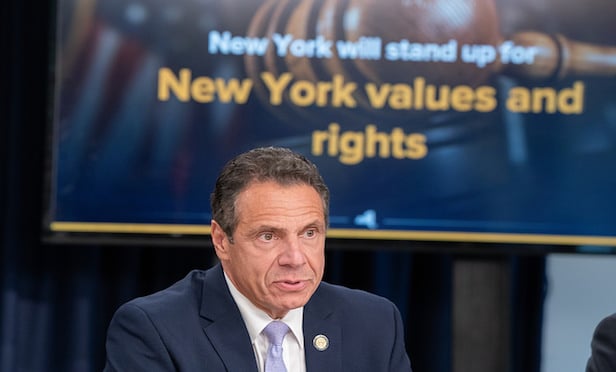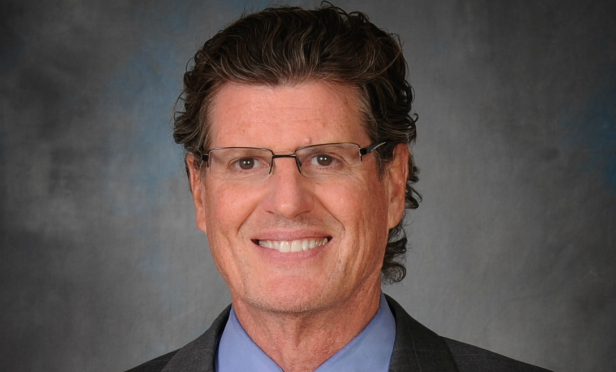ALBANY—Construction, business and political leaders in New York State expressed their support of New York Gov. Andrew Cuomo's ambitious multi-year $100-billion investment initiative to repair, replace and modernize the state's infrastructure.
However, the governor did get some push back on some of his other "signature" proposals, including his call for a $15-an-hour minimum wage for entry-level workers. Cuomo laid out his $145-billion 2016 state budget in his "State of the State" message here on Wednesday afternoon.
Labeled his "Built to Lead" infrastructure program, Cuomo's proposals run the gamut from a five-year $22-billion plan to fund the New York State Department of Transportation's multi-year road and bridge repair capital program, helping fund the Tappan Zee Bridge and the Thruway toll system, to major capital projects at Penn Station and the Javits Center, to even spending $5 million for a feasibility study to once again look at the development of a multi-billion dollar tunnel linking Long Island to Westchester County, the Bronx or Connecticut.
His proposed budget plan also includes a ramp up in investment to build and preserve affordable housing and in education funding, as well as a number of government ethics reform measures. The plan also calls for a $300-million small business tax cut.
Another major component of the 2016 budget proposal is a more than $20-billion investment over five years for the expansion of affordable housing and the state's homeless program. The governor is proposing to create and preserve 100,000 affordable housing units across the state. The plan, if approved, would boost state spending on housing programs by nearly $5 billion.
Says New York Building Congress president Richard T. Anderson, "In addition to the sheer scope of his transformative proposals, which encompass airports, tunnels, bridges, mass transit and economic development, Gov. Cuomo has embraced the types of innovative methods, such as public-private partnerships and design-build, that will ensure these projects can be delivered on time and on budget."
However, the governor's plan received a luke-warm response from some Republican political leaders. For example, former Republican gubernatorial challenger and Westchester County executive Robert Astorino characterized the governor's ambitious infrastructure program as "delusional."
"Mr. Cuomo is playing disingenuous games with proposals he knows will never happen," claimed Astorino. "If they did, the state would be bankrupted."
In addition to the nearly $4 billion new Tappan Zee Bridge project, a multi-billion dollar commitment to the estimated $20 billiom Gateway Tunnel project in New York City and New Jersey and previously announced $4 billion improvement and modernization projects at LaGuardia and JFK airports, the governor proposed a major expansion and improvement project for the Long Island Rail Road between Floral Park and Hicksville, improvements to Republic Airport and a $5 million study of a tunnel connecting Long Island to the Bronx, Westchester or Connecticut.
The plan also calls for the state to invest $700 million in Thruway infrastructure, $3 billion to transform Penn Station and the historic James A. Farley Post Office and a $1-billion proposal to redevelop the Jacob K. Javits Convention Center.
The governor also calls for $26.1-billion over the next five years to fund mass transit. According to figures supplied by New York State, the state's share of funding the MTA's capital program would be more than $8.3 billion. This proposal includes the redesign and improvements to 30 existing subway stations across the system.
The Business Council of New York State praised the governor for holding spending below 2%. However, Business Council President Heather C. Briccetti said the organization is adamantly opposed to the $15-an-hour minimum wage proposal.
"Its impact will be especially significant among young and low-skilled workers seeking entry-level jobs, and in areas upstate that have yet to recover losses sustained during the Great Recession," she said in a prepared statement. "The Business Council also has real concerns about the proposed paid leave mandate on employers. We believe this mandate would be particularly harmful to the same small businesses the Governor is supporting through other budget initiatives."
Want to continue reading?
Become a Free ALM Digital Reader.
Once you are an ALM Digital Member, you’ll receive:
- Breaking commercial real estate news and analysis, on-site and via our newsletters and custom alerts
- Educational webcasts, white papers, and ebooks from industry thought leaders
- Critical coverage of the property casualty insurance and financial advisory markets on our other ALM sites, PropertyCasualty360 and ThinkAdvisor
Already have an account? Sign In Now
*May exclude premium content© 2024 ALM Global, LLC, All Rights Reserved. Request academic re-use from www.copyright.com. All other uses, submit a request to [email protected]. For more information visit Asset & Logo Licensing.







